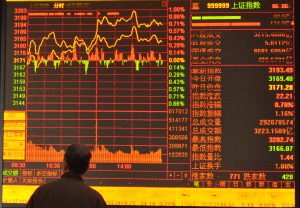China’s stock market has historically contended with a variety of systemic inefficiencies that compromise both its value and integrity. Under the helm of Wu Qing, the newly appointed chairman of the China Securities Regulatory Commission (CSRC), there appears to be a significant shift in policy orientation aimed at addressing these persistent issues and enhancing market confidence.
The need for a comprehensive overhaul is urgent. Following the 2008 global financial crisis, the Chinese government initiated a vast stimulus package, predominantly funneled into infrastructure and real estate, to mitigate economic repercussions. While this strategy temporarily stabilized the economy, it also led to a considerable increase in debt for local governments and state-owned enterprises. This escalating debt has placed substantial strain on the banking sector, burdened with non-performing loans and extended credit lines.
The faltering real estate sector, once a mainstay of growth, has played a significant role in the recent instability of China’s stock market. This downturn has had a detrimental impact on both consumer wealth and investor confidence, resulting in a substantial reduction in market liquidity, which is predominantly supported by retail investors. Furthermore, the depreciation in property values undermines the value of collateral securing loans, exacerbating the financial instability.
In response to these challenges, President Xi Jinping has introduced an initiative aimed at cultivating “new productive forces,” centering on sectors with high technological potential. Although critical for shifting the economic trajectory, these innovation-driven sectors introduce additional complexities to the financial system’s functioning due to their inherent risks and the extensive, significant demands of their financing needs.
The appointment of Wu Qing as CSRC chairman marks a profound shift in regulatory philosophy. Distinct from his predecessors, who often prioritized corporate financing over investor protection, Wu’s background in direct regulatory interventions and strategic policymaking at the CSRC suggests a more cautious approach.
Wu’s strict stance on compliance is well-documented; he became known as the “Brokerage Butcher” for his stringent enforcement during his tenure at the CSRC’s Risk Disposal Office. His previous collaboration with Li Qiang, now premier of the State Council, in advancing economic initiatives in Shanghai, indicates a potentially synergistic approach that could afford Wu greater autonomy in implementing changes at the CSRC.
Under Wu’s stewardship, the CSRC is implementing a series of reforms. Prominent among these is the establishment of a stringent system for the listing and delisting of companies, designed to ensure that only the most financially robust and well-managed entities prevail.
At the heart of these reforms is an emphasis on bolstering medium to long-term investments. The CSRC is comprehensively revamping the annual assessment processes for these investment vehicles and introducing strict regulations to mitigate high-frequency trading and curtail speculative activities.
Moreover, the CSRC is determined to enhance the attractiveness of the Chinese stock market by strengthening the dividend distribution system. This strategy aims to augment market appeal by offering more substantial returns to shareholders, thereby attracting a wider array of investors and improving the overall health of the market. A key component of this initiative is the issuance of “ST” warnings to companies with insufficient dividend policies, effectively sidelining firms that do not sufficiently reward their investors.
Additionally, there has been a marked increase in the penalties for legal and regulatory infractions, emphasizing the CSRC’s dedication to maintaining rigorous standards of corporate governance and ensuring market integrity.
Recent reforms have initiated a significant enhancement of the institutional and regulatory framework governing China’s capital markets, yet their tangible effects remain a subject for empirical evaluation. Initially, these reforms have sparked cautious optimism, reflected in the revitalization of market indices and renewed interest from international investors. Moreover, the CSRC’s intensified efforts to enforce regulations and refine investor safeguards demonstrate a commitment to addressing previous lapses.
However, the complexity of Chinese investor demographics often complicates regulatory accountability. Particularly for small investors, this poses significant challenges in effectively using legal measures to protect their rights. Moreover, while the imposition of “ST” status on companies that fail to distribute substantial profits is essential to ensure equitable returns for investors, it is also necessary to consider the varied life cycles of companies and the feasibility of their dividend strategies.
As the CSRC increasingly focuses on bolstering investor protections, it is critical to maintain a balance that does not hinder the market’s ability to finance. The capital market must continue to foster an environment conducive to the development of high-quality enterprises.
There are also ongoing concerns about the sustainability of state interventions, such as significant investments by the “national team” in exchange-traded funds during market fluctuations. While these measures have lent stability, the principal challenge lies in maintaining these improvements without perpetual state intervention, thereby cultivating a robust market ecosystem capable of independent growth.
































